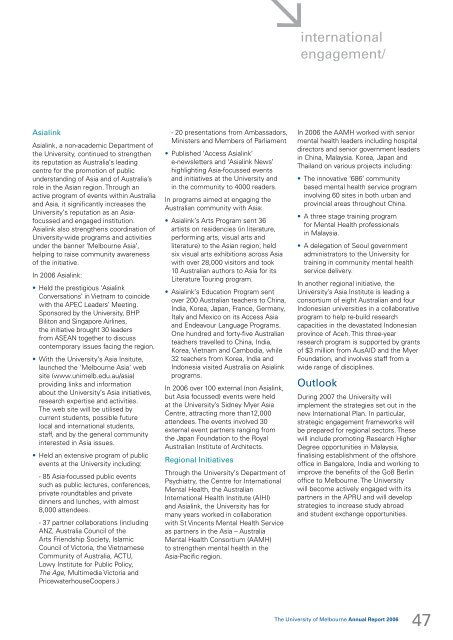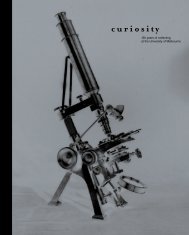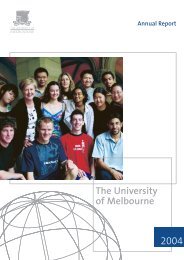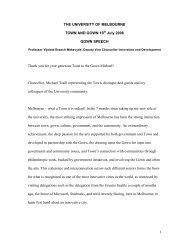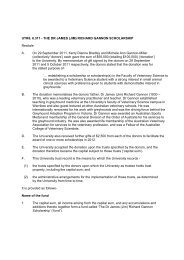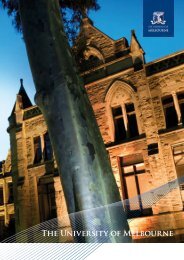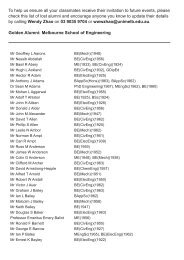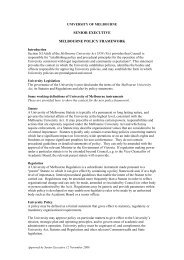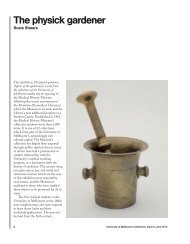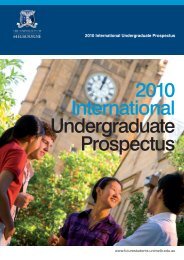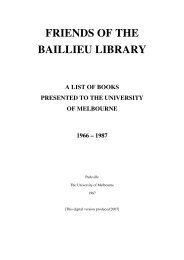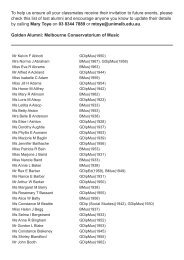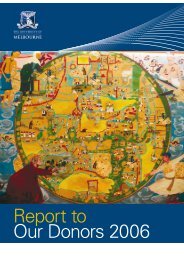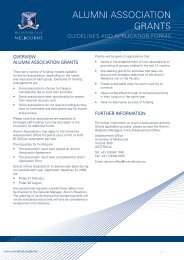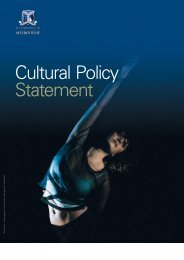annual report/2006 - University of Melbourne
annual report/2006 - University of Melbourne
annual report/2006 - University of Melbourne
You also want an ePaper? Increase the reach of your titles
YUMPU automatically turns print PDFs into web optimized ePapers that Google loves.
international<br />
engagement/<br />
Asialink<br />
Asialink, a non-academic Department <strong>of</strong><br />
the <strong>University</strong>, continued to strengthen<br />
its reputation as Australia’s leading<br />
centre for the promotion <strong>of</strong> public<br />
understanding <strong>of</strong> Asia and <strong>of</strong> Australia’s<br />
role in the Asian region. Through an<br />
active program <strong>of</strong> events within Australia<br />
and Asia, it significantly increases the<br />
<strong>University</strong>’s reputation as an Asiafocussed<br />
and engaged institution.<br />
Asialink also strengthens coordination <strong>of</strong><br />
<strong>University</strong>-wide programs and activities<br />
under the banner ‘<strong>Melbourne</strong> Asia’,<br />
helping to raise community awareness<br />
<strong>of</strong> the initiative.<br />
In <strong>2006</strong> Asialink:<br />
• Held the prestigious ‘Asialink<br />
Conversations’ in Vietnam to coincide<br />
with the APEC Leaders’ Meeting.<br />
Sponsored by the <strong>University</strong>, BHP<br />
Biliton and Singapore Airlines,<br />
the initiative brought 30 leaders<br />
from ASEAN together to discuss<br />
contemporary issues facing the region.<br />
• With the <strong>University</strong>’s Asia Insitute,<br />
launched the ‘<strong>Melbourne</strong> Asia’ web<br />
site (www.unimelb.edu.au/asia)<br />
providing links and information<br />
about the <strong>University</strong>’s Asia initiatives,<br />
research expertise and activities.<br />
The web site will be utilised by<br />
current students, possible future<br />
local and international students,<br />
staff, and by the general community<br />
interested in Asia issues.<br />
• Held an extensive program <strong>of</strong> public<br />
events at the <strong>University</strong> including:<br />
- 85 Asia-focussed public events<br />
such as public lectures, conferences,<br />
private roundtables and private<br />
dinners and lunches, with almost<br />
8,000 attendees.<br />
- 37 partner collaborations (including<br />
ANZ, Australia Council <strong>of</strong> the<br />
Arts Friendship Society, Islamic<br />
Council <strong>of</strong> Victoria, the Vietnamese<br />
Community <strong>of</strong> Australia, ACTU,<br />
Lowy Institute for Public Policy,<br />
The Age, Multimedia Victoria and<br />
PricewaterhouseCoopers.)<br />
- 20 presentations from Ambassadors,<br />
Ministers and Members <strong>of</strong> Parliament<br />
• Published ‘Access Asialink’<br />
e-newsletters and ‘Asialink News’<br />
highlighting Asia-focussed events<br />
and initiatives at the <strong>University</strong> and<br />
in the community to 4000 readers.<br />
In programs aimed at engaging the<br />
Australian community with Asia:<br />
• Asialink’s Arts Program sent 36<br />
artists on residencies (in literature,<br />
performing arts, visual arts and<br />
literature) to the Asian region; held<br />
six visual arts exhibitions across Asia<br />
with over 28,000 visitors and took<br />
10 Australian authors to Asia for its<br />
Literature Touring program.<br />
• Asialink’s Education Program sent<br />
over 200 Australian teachers to China,<br />
India, Korea, Japan, France, Germany,<br />
Italy and Mexico on its Access Asia<br />
and Endeavour Language Programs.<br />
One hundred and forty-five Australian<br />
teachers travelled to China, India,<br />
Korea, Vietnam and Cambodia, while<br />
32 teachers from Korea, India and<br />
Indonesia visited Australia on Asialink<br />
programs.<br />
In <strong>2006</strong> over 100 external (non Asialink,<br />
but Asia focussed) events were held<br />
at the <strong>University</strong>’s Sidney Myer Asia<br />
Centre, attracting more than12,000<br />
attendees. The events involved 30<br />
external event partners ranging from<br />
the Japan Foundation to the Royal<br />
Australian Institute <strong>of</strong> Architects.<br />
Regional Initiatives<br />
Through the <strong>University</strong>’s Department <strong>of</strong><br />
Psychiatry, the Centre for International<br />
Mental Health, the Australian<br />
International Health Institute (AIHI)<br />
and Asialink, the <strong>University</strong> has for<br />
many years worked in collaboration<br />
with St Vincents Mental Health Service<br />
as partners in the Asia – Australia<br />
Mental Health Consortium (AAMH)<br />
to strengthen mental health in the<br />
Asia-Pacific region.<br />
In <strong>2006</strong> the AAMH worked with senior<br />
mental health leaders including hospital<br />
directors and senior government leaders<br />
in China, Malaysia. Korea, Japan and<br />
Thailand on various projects including:<br />
• The innovative ‘686’ community<br />
based mental health service program<br />
involving 60 sites in both urban and<br />
provincial areas throughout China.<br />
• A three stage training program<br />
for Mental Health pr<strong>of</strong>essionals<br />
in Malaysia.<br />
• A delegation <strong>of</strong> Seoul government<br />
administrators to the <strong>University</strong> for<br />
training in community mental health<br />
service delivery.<br />
In another regional initiative, the<br />
<strong>University</strong>’s Asia Institute is leading a<br />
consortium <strong>of</strong> eight Australian and four<br />
Indonesian universities in a collaborative<br />
program to help re-build research<br />
capacities in the devastated Indonesian<br />
province <strong>of</strong> Aceh. This three-year<br />
research program is supported by grants<br />
<strong>of</strong> $3 million from AusAID and the Myer<br />
Foundation, and involves staff from a<br />
wide range <strong>of</strong> disciplines.<br />
Outlook<br />
During 2007 the <strong>University</strong> will<br />
implement the strategies set out in the<br />
new International Plan. In particular,<br />
strategic engagement frameworks will<br />
be prepared for regional sectors. These<br />
will include promoting Research Higher<br />
Degree opportunities in Malaysia,<br />
finalising establishment <strong>of</strong> the <strong>of</strong>fshore<br />
<strong>of</strong>fice in Bangalore, India and working to<br />
improve the benefits <strong>of</strong> the Go8 Berlin<br />
<strong>of</strong>fice to <strong>Melbourne</strong>. The <strong>University</strong><br />
will become actively engaged with its<br />
partners in the APRU and will develop<br />
strategies to increase study abroad<br />
and student exchange opportunities.<br />
The <strong>University</strong> <strong>of</strong> <strong>Melbourne</strong> Annual Report <strong>2006</strong><br />
47


